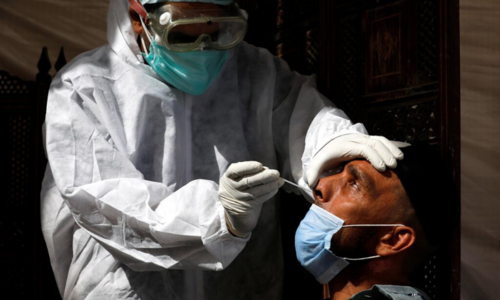• Umar says AJK polls acted as super spreader for virus
• 40m doses of vaccine administered
ISLAMABAD: As the country reported over 100 deaths caused by Covid-19 in a single day after a gap of almost three months, NCOC head Asad Umar said that the recent Azad Jammu and Kashmir general elections had acted as a super spreader for the coronavirus and that positivity rate had surged to 30pc in the region.
While criticising the opposition Pakistan Democratic Movement (PDM)’s decision to hold a public meeting in Karachi, he alleged that the worst violations of the standard operating procedures (SOPs) over the last one year had been committed by politicians.
Meanwhile, the country has administered over 40 million doses of vaccine and the last 10m doses were administered in just nine working days.
The data of the National Command and Operation Centre (NCOC) showed that 102 deaths and 4,934 new cases were reported in a single day. Earlier, over 100 deaths were reported on May 19 when 131 persons died in a single day. The number of active cases was 86,217 out of which 5,042 patients were admitted to hospitals across the country on Thursday. Moreover, the data showed that 71pc oxygenated beds allocated for Covid-19 patients were in use in Abbottabad, 59pc in Karachi and 50pc in Diamer.
Mr Umar blamed elections in AJK for recent surge in cases of Covid-19.
“Had recommended that AJK elections (should) get postponed for a couple of months and a special vaccination campaign run before the elections. It was not agreed. Since the elections the positivity of AJK is running between 25 and 30pc. Elections have acted as a super spreader event,” he tweeted.
The minister also criticised the decision of the PDM to hold a public meeting in Karachi.
“Two weeks back Bilawal Zardari was threatening to hold PM and ministers accountable if Covid spreads further in Karachi and now PDM announces holding a jalsa this month in Karachi!! Sadly the worst violations of Covid sop’s in the last one year have come from politicians,” Mr Umar said in another tweet.
Meanwhile, the country has administered 40m jabs of Covid-19 vaccine and 100m more doses have to be administered to achieve herd immunity by vaccinating over 70m people.
“4 crore vaccination doses administered. The last crore took only 9 working days to administer. Keep it Pakistan. Let’s vaccinate and make Pakistan safe from this disease,” Mr Umar said in his third tweet.
WHO to conduct study
According to a statement of the World Health Organisation (WHO), it has recently asked countries to prioritise recognition, rehabilitation and research for the consequences of Covid-19, and the collection of standardised data on long Covid and proposed that the term “post Covid-19 condition” should be used for people living with long Covid.
A significant portion of people diagnosed with Covid-19 subsequently experience lasting symptoms including fatigue, breathlessness and neurological complications months after the acute infection. However, the evidence for this condition is limited and based on small patient cohorts with short-term follow-up.
“There is an urgent need for the development of a core outcome set (COS) to optimise and standardise clinical data collection and reporting across studies (especially clinical trials) and clinical practice for this condition. With this in mind, clinical research communities and people living with Post Covid-19 condition have come together to respond to this emerging global healthcare crisis. An international group of experts in COS development and Post Covid-19 Condition research and clinical practice have developed a programme of research together with WHO, ISARIC (International Severe Acute Respiratory and emerging Infection Consortium), and patient partners to develop a Post Covid-19 Condition COS,” the statement said.
“The project, Post-Covid Condition Core Outcomes, will start by surveying people living with Post-Covid-19 condition, assess what outcomes matter and build a plan in two phases. The first phase will focus on what outcomes should be measured and the second phase will focus on how to measure these outcomes. Researchers aim to complete the first phase (what outcomes to measure) in the summer of 2021 and the second phase (how to measure these outcomes) in 2022,” it stated.
Published in Dawn, August 13th, 2021














































